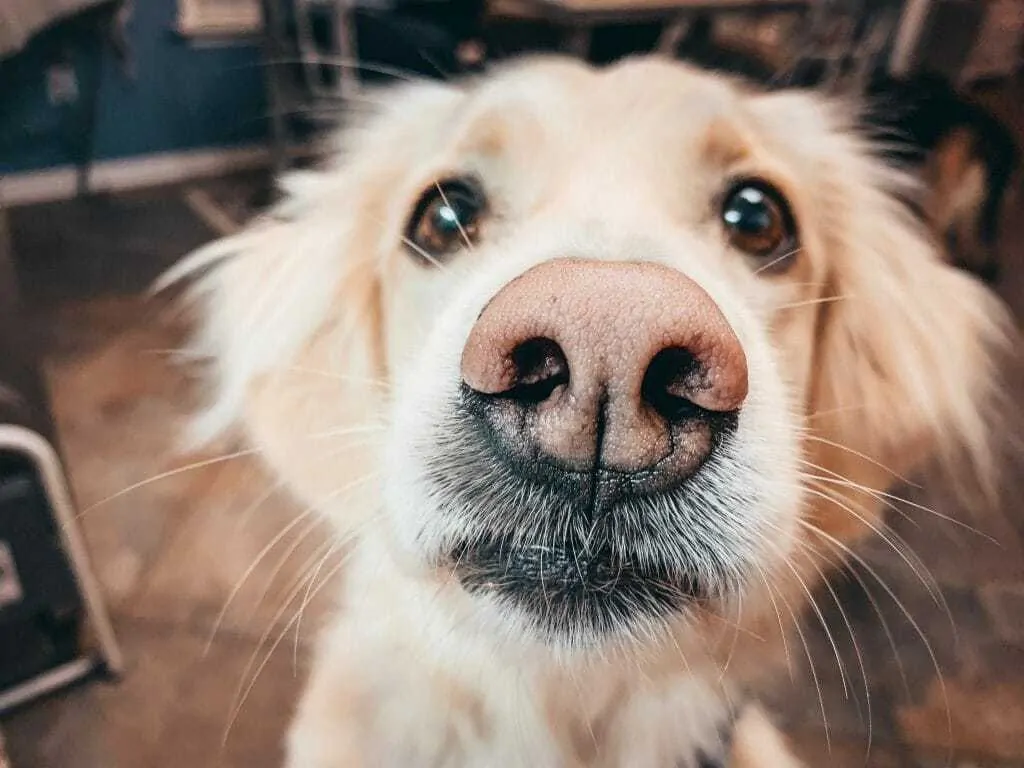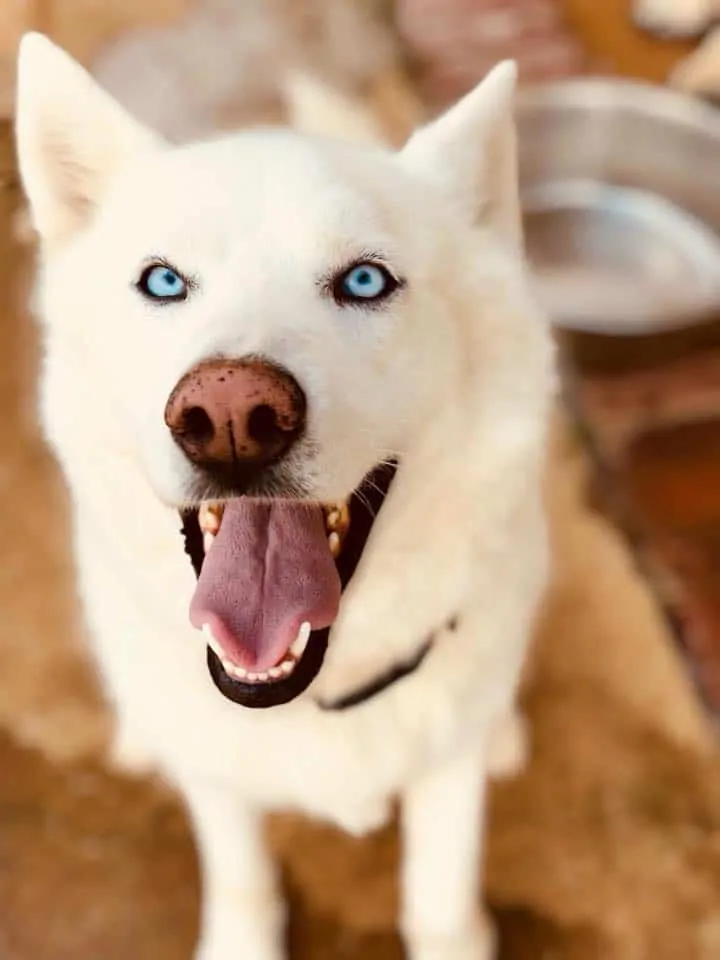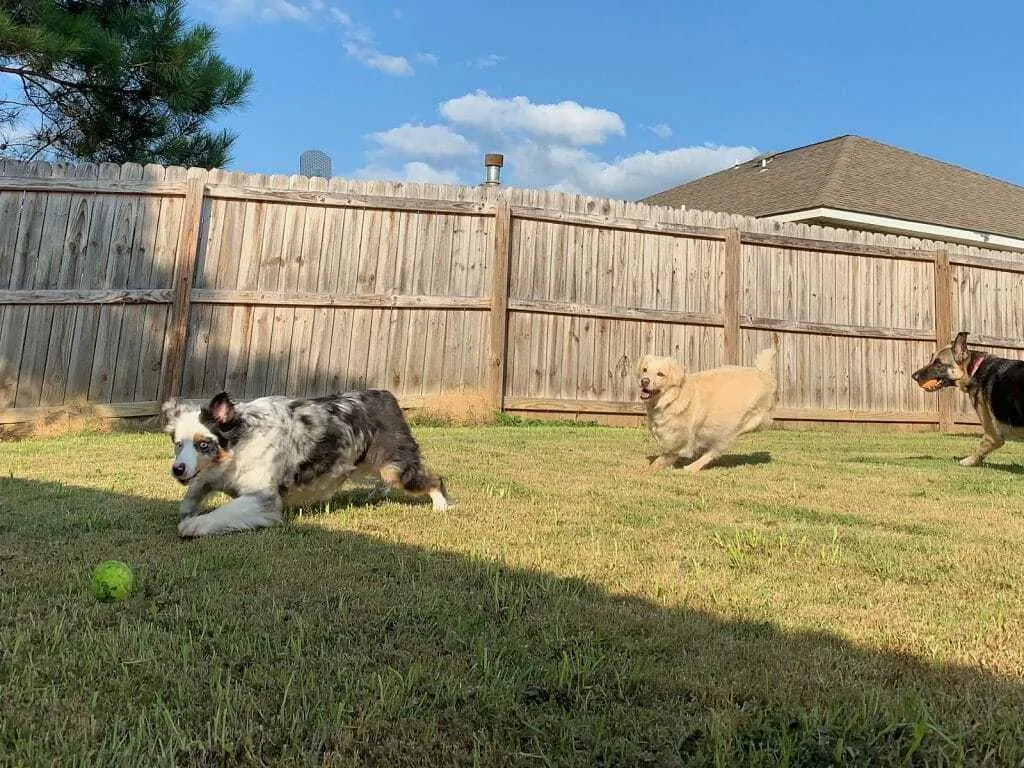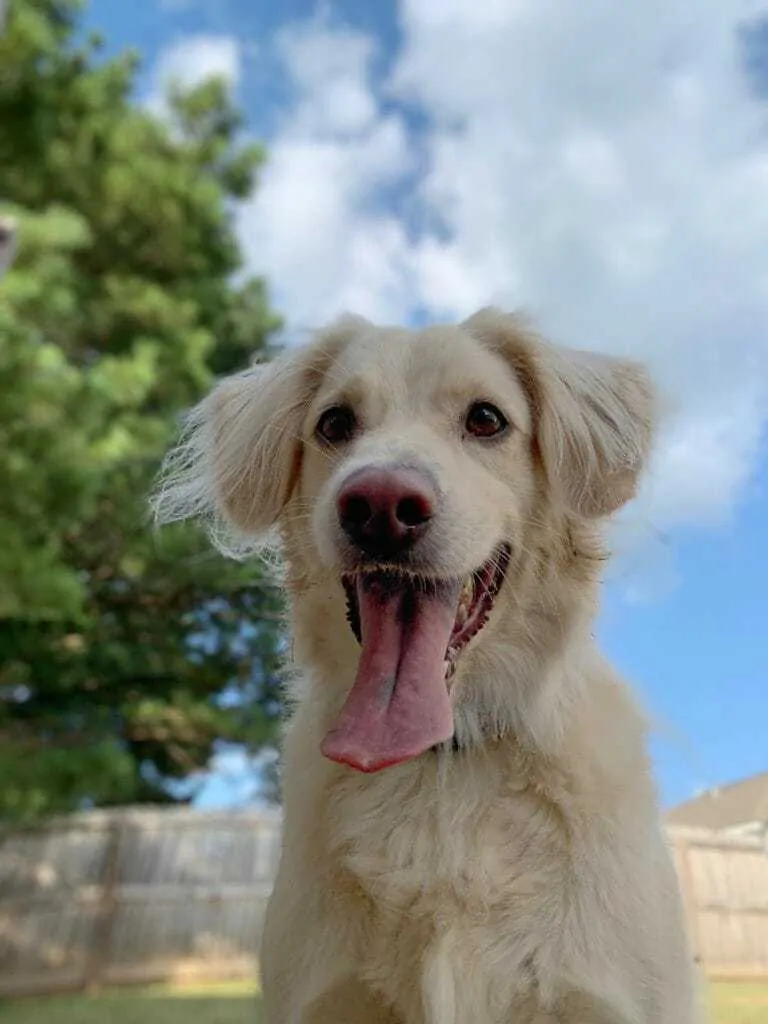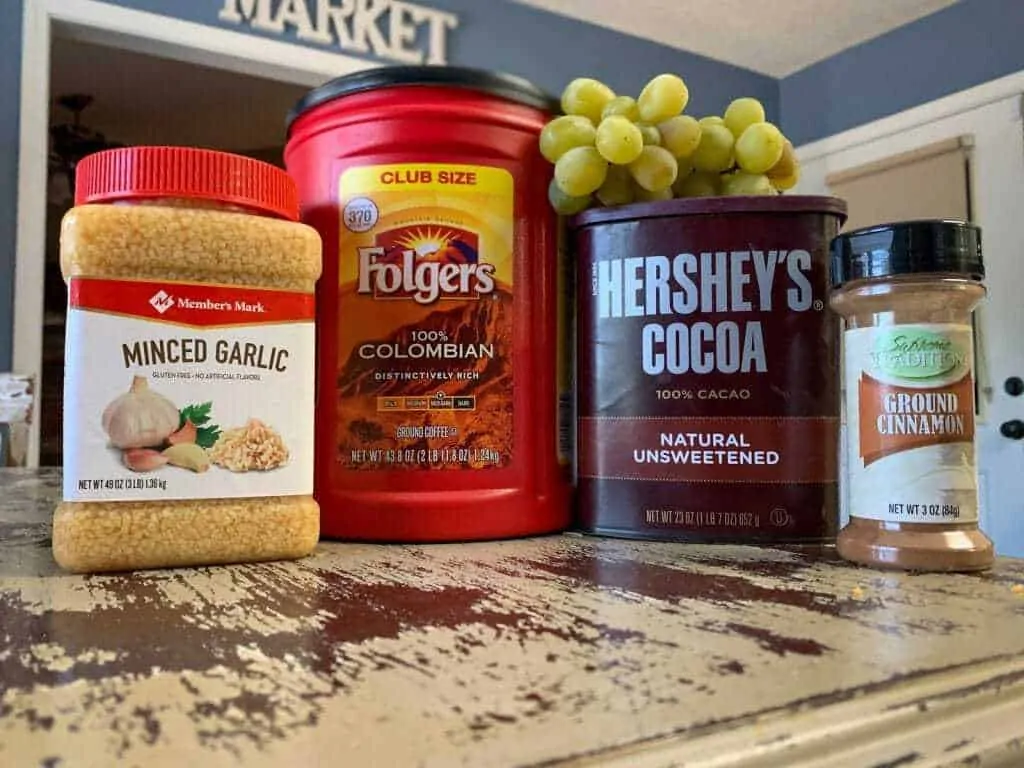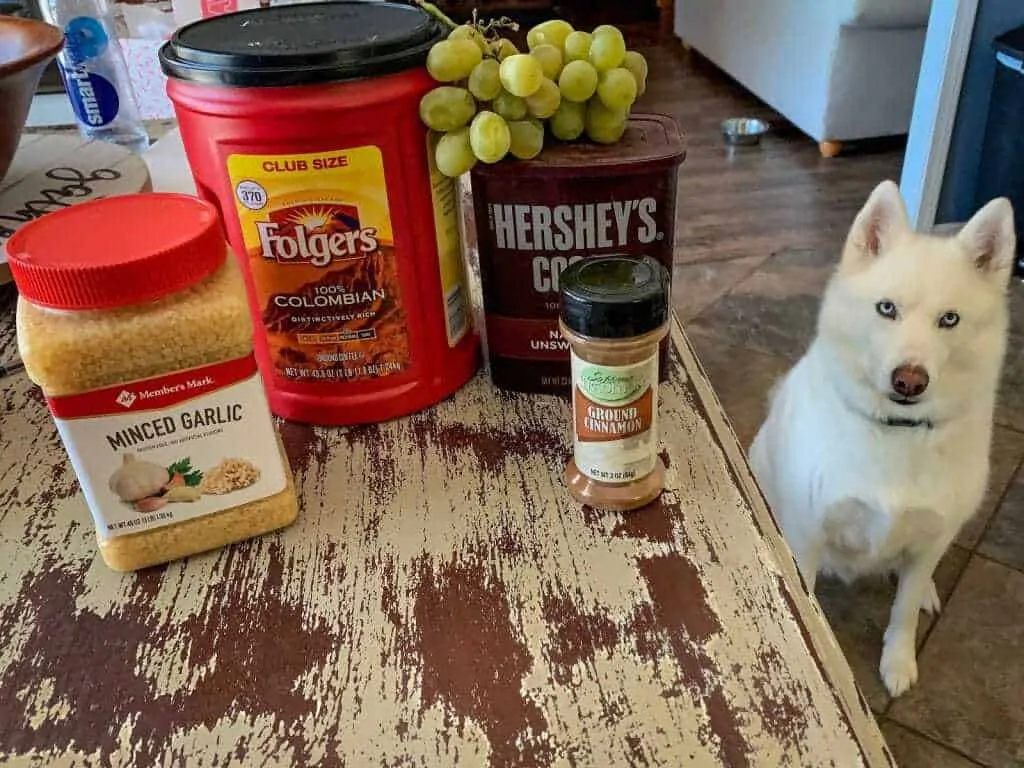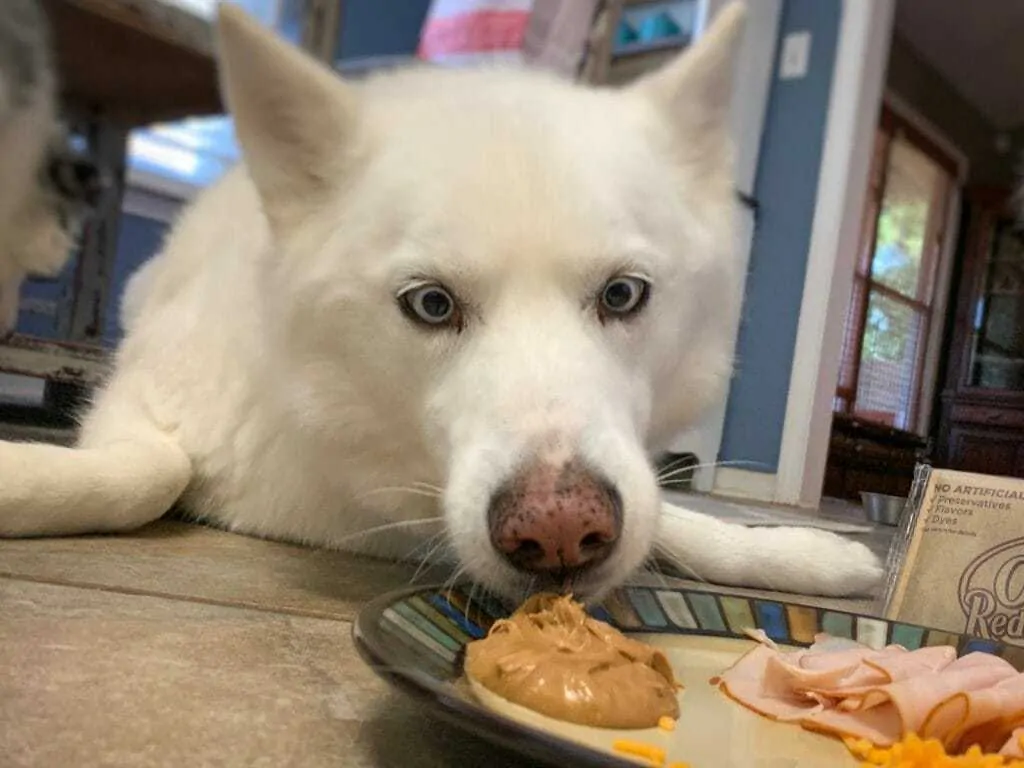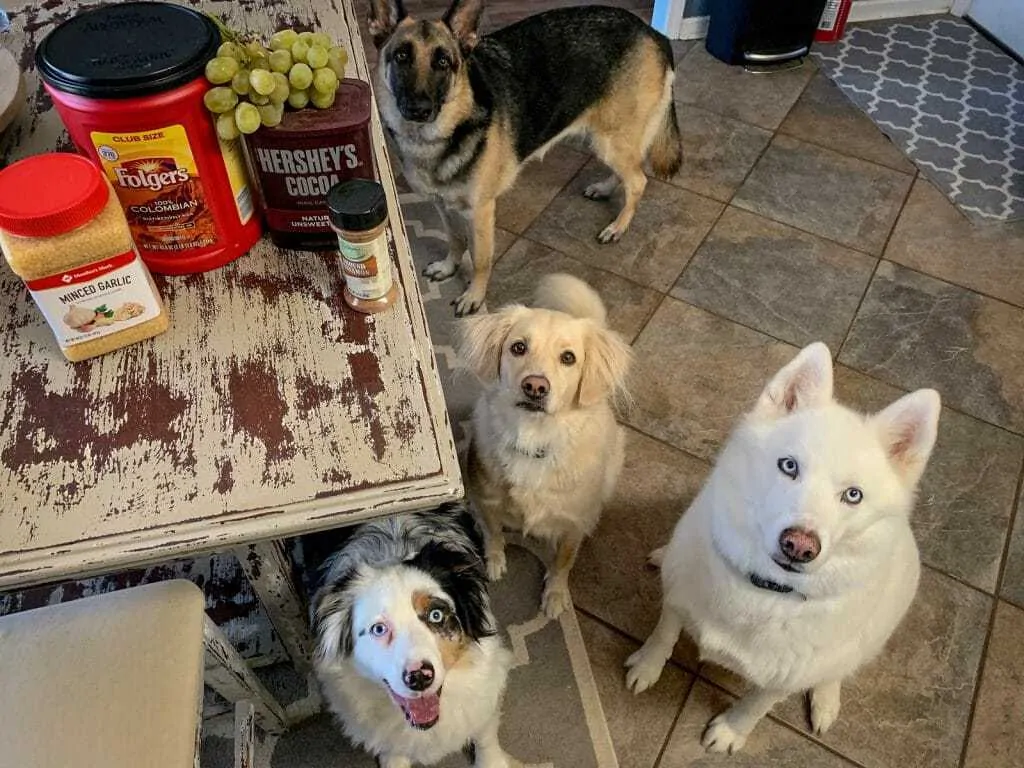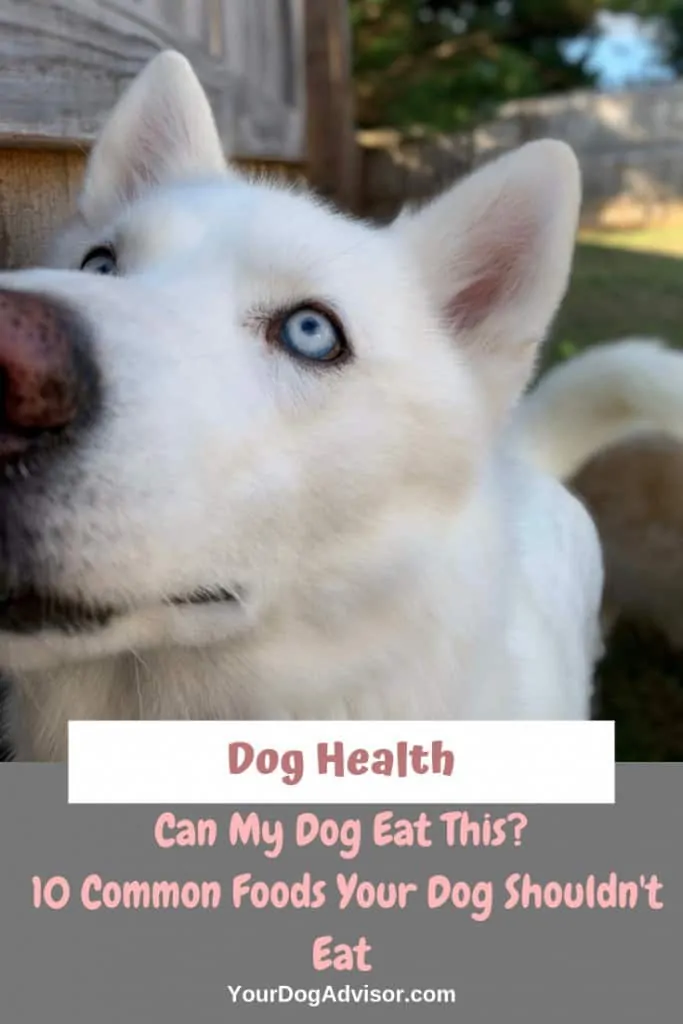It’s a Monday night and you’re finally sitting down at the dinner table to eat after a long exhausting day at work. You’re trying to be healthy, even though you’d prefer to just throw a frozen pizza in the oven. Your dinner consists of several healthy options: grapes, fish, and broccoli. You’re still drinking your glass of Merlot though because some things just aren’t worth sacrificing. As you start to pop a grape into your mouth, you glance down and see your dog staring at you. You know exactly where I’m going with this. As a dog parent, we all know the struggle of fighting against the most lethal weapon in our dog’s arsenal — “puppy dog” eyes.
Our dogs love to beg for food and let’s be honest, they are pretty darn good at it. However, we should always be conscious of how the food we share with our dogs affects their health. Some foods can be lethal and have long term consequences, while others are perfectly fine to consume. In other words, fight those “puppy dog” eyes and check the facts before signing the peace treaty.
But should you give your dog a bite of everything on your plate? Sure, your dog is practically pleading with you to accidentally knock a piece of broccoli onto the floor, and maybe you’d rather feed your broccoli to the dog, but is it safe for their health? A dog’s digestive system is much more sensitive than our own and is not designed to tolerate many of the foods that we eat on a daily basis. Some foods can actually be lethal to your dog in large amounts!
So what foods are bad for dogs? This article will discuss the differences between your gut and your dog’s and provide a list of 10 foods you shouldn’t feed your dog. We will end our article with a few safe and healthy human food options for your pup and what you should do if your dog eats something it shouldn’t.
Contents
Your Stomach vs Your Dog’s Stomach: What’s the Difference?
There are a number of differences between your stomach and your dog’s. This has a lot to do with why your dog can’t consume alcohol, but you can party all night long with only a hangover as a consequence. This also explains why your dog can survive in the wilderness on wild animals and you’d end up violently ill after biting into a raw dead squirrel. So how do our dog’s tummies function in comparison to our on? Let’s dig into the basics.
The Jaw and Teeth
You’ve likely never paid attention to the way you chew your food. You do it automatically and with very little thought. The way you chew your food is unique and different from your canine bestie eating on the floor next to you. Our jaw structure allows for greater flexibility while we chew our food. Our jaw structure makes it possible for us to chew our food by moving our jaw up and down and side to side. This enables us to eat many different kinds of foods, including foods of different sizes and textures. Dogs on the other hand can only move their jaws up and down. This means dogs have to work harder while eating chunks of food because they physically can not take the extra time to chew and grind their food down into smaller easier to digest pieces.
Dogs were historically bred to survive by killing and eating small animals. Their mouths and teeth are designed perfectly for that, even though most dogs are not doing a great deal of hunting anymore. Their teeth are designed for ripping and tearing and their jaws are strong enough to keep thrashing prey in their hold.
Furthermore, the design of your teeth also gives you an upper hand when it comes to grinding down food. We may have our own set of canine teeth, like our dogs, but the rest of our teeth are generally flat. This means that our teeth are meant to grind food down rather than tear it apart. Our dogs have much larger and sharper canine teeth, along with rows of pointed teeth. Dogs were meant to tear at their food and pull it apart into pieces that they can devour quickly. This makes a lot of sense when you consider that our dog’s wolf ancestors had to catch their food, kill it, and consume it quickly before another predator attempted to steal it.
Cholesterol Absorption
One interesting fact about your dog’s digestive health in comparison to our own is that dog’s can consume as much cholesterol heavy food as they want without any health complications. Humans often have to watch their cholesterol numbers to maintain a long and healthy life. Some people have to take medication to keep their cholesterol within a healthy range while others substitute foods in their diet with cholesterol free options.
However, dogs have digestive systems that are able to absorb cholesterol without it affecting their heart. This again goes back to their wild dog heritage. Wolves and other wild dogs weren’t exactly able to be choosy about their diet options and had to depend on their ability to hunt to survive. Furthermore, to keep up the stamina to travel and hunt, they needed to consume meat and their bodies absorb it without growing sluggish. Clearly, they were hardwired for survival.
This reiterates the point that our dogs stomachs were designed to handle only certain ingredients, nutrients, and types of food. Dogs were not bred to eat the kinds of food that we normally eat because the ingredients generally were not a part of their ancestor’s diets.
Digestion and Conserving Energy
Another fact about your dog’s digestive health is that your dog digests food at a much slower rate than you do. Humans generally take an hour or more for their food to breakdown and start digesting in our stomachs. Dogs have a much higher acidic level in their stomachs, since they were biologically designed to consume mostly meat. Furthermore, their stomachs will hold on to food throughout the day instead of burning through it quickly just to eat again later. This helps them to stay fuller longer and that makes sense when we think about the survival of dogs in the wild. Wolves, coyotes, and other wild canines may go days without food before they are able to catch their next meal. Conserving energy over longer periods of time is a key part of a dog’s survival in the wilderness. This is why your dog can be satisfied with eating once or twice a day without feeling starved.
While we may need to eat breakfast, lunch, dinner, and maybe a few snacks in between — dogs can function easily on just one or two meals per day. If you’re wondering why your dog has so much extra energy to burn, remember that your dog can literally store energy all day long. You might be tired, but they definitely aren’t! Dogs were built for endurance and their digestive system helps support that.
Saliva
Another difference between our digestive system and our dog’s is that our saliva has a completely different purpose. For us, our saliva is used to moisten and lubricate our food for easy digestion. The saliva in your dog’s mouth is used to kill and destroy bacteria in their food.
This is why a wolf can snatch up a rabbit in the woods and go right to town eating it without getting ill. Dogs have developed enzymes in their saliva to break down the bacteria that causes sickness. Since wolves and other wild dogs eat a lot of wild vermin, it only seems right that nature would come up with an evolutionary answer to eliminate potential health risks for dogs. This is why your dog might kill a rat in the backyard without needing a trip to the vet, assuming it doesn’t have rabies or some other infectious disease.
You may find yourself wiping your face constantly if your dog is a face licker. “So much saliva”, you think to yourself with a groan, “why so much drool?!” Their saliva has a very specific survival purpose. It breaks down bacteria in their food so they keep on as efficient hunters in the wild. So the next time your dog licks your face, just pretend that they’re cleaning it.
Carbs Are On the Menu
We’ve talked a lot so far about how dogs are built for survival, just like their wild canine cousins. It’s true that their lineage has a lot to do with why your dog’s stomach functions as it does, but there are some unique characteristics that your dog has that wild dogs do not. Due to years of domestication and breeding, our dogs are able to digest carbohydrates. Since wild dog’s are naturally carnivorous, carbs are not an essential component of their diet. Our pups, like the one sitting on your couch right now in a sweater and steadily chewing on a squeaky toy are definitely not solely carnivores anymore.
Dogs can eat a number of new items that their ancestors never would have sought out, and this means that carbs are on the menu for our dogs at home. Carbs can be absorbed and easily digested by domesticated dogs, so this means their tummies get to enjoy a new list of options that their ancestors would only dream about. Our dogs still require many of the vitamins and nutrients associated with a carnivorous diet, but unlike wild dogs, our dogs can generate some of these nutrients from the carbs in veggies and grains.
What Foods Are Bad For Dogs – 10 Common Foods Your Dog Shouldn’t Eat
What foods are bad for dogs? The following list contains examples of foods that your dog shouldn’t eat. Several of these foods can be lethal or cause very harmful side effects. As a general rule, it’s a good idea to keep any of the below foods out of your dog’s reach. There are many other foods and ingredients that did not end up on this list, so if you have any concerns about a particular item not listed, do a little extra research before offering it to your pet.
There are a number of foods and ingredients that dogs shouldn’t eat. Our list includes ten, but there are many others. Always check the labels of the foods in your fridge and pantry before offering a bite to your dog. Garlic, coffee, chocolate (cocoa), cinnamon, and grapes are all foods that your dog should not consume. Some foods not listed include: citrus, raisins, and yeast dough, among others.
Can Dogs Eat Grapes? NO
Grapes may seem like a completely harmless treat to give your dog. They are healthy for us and are a better alternative to eating sugary desserts. However, grapes are absolutely not a safe option for dogs. Though the deadly toxin in grapes has yet to be identified, it is clear that grapes can cause kidney failure in dogs. Even if only a small amount is eaten, dogs may start to have symptoms of vomiting and sluggishness before a diagnosis of kidney failure. The bottomline, grapes can be life threatening and should never be given to your dog.
Can Dogs Eat Garlic? NO
Garlic is another human food that can cause damage to dogs. Not only can garlic cause gastrointestinal irritation, but it can also cause damage to your dog’s red blood cells. Similar food options that will cause the same reaction are onions and chives. Raw and cooked garlic can cause damage to your dog, so keep the garlic bread to yourself!
Can Dogs Eat Ice Cream? NO
Ice cream is on this list not necessarily because it causes harmful or life threatening short term side effects, but because of the long term health consequences. A small amount of ice cream will not hurt your dog, but you should be conscious of the fact that it is high in sugar, and that your dog may have an intolerance to lactose. In general, dairy shouldn’t be given to your dog since it can cause stomach upset and more severe issues for pups that are lactose intolerant. There are several ice cream food chains that will give you a free cup of plain ice cream to your dog, and though this may be tempting, it should not be a routine treat for your pup or given to them in large quantities. Instead, you can give your dog frozen fruit as a tasty and safe alternative.
Can Dogs Eat Chocolate? NO
Chocolate is likely the first thing that came to your mind when you saw the headline to this article. Yes, it is a definite fact that chocolate should never be consumed by dogs. The substance in chocolate that makes it such a harmful food is methylxanthine. Consuming methylxanthine will halt your dog’s metabolic process, and can cause vomiting, diarrhea, seizures, heart palpitations, and death. You should never have chocolate sitting around where your dog may steal a bite, and if your dog ever consumes chocolate, you should contact your veterinarian immediately, or your local emergency vet.
Can Dogs Drink Alcohol? NO
Alcohol may be fun to us, but it can have serious consequences if consumed by dogs. Alcohol can affect the central nervous system and cause tremors, difficulty breathing, coma, and death. Other side effects can include vomiting, diarrhea, and changes in blood acidity. Dogs were not bred to ingest alcohol, so their bodies are unable to break it down in the same way that we can. So even though it might be humorous to share a beer with your canine companion, a few laughs are not worth the consequences.
Can Dogs Drink Coffee? NO
Caffeine in any form can be deadly. Like chocolate, coffee also contains methylxanthine. Methylxanthine is found in the seeds, beans, and grounds of coffee. The same side effects caused from eating chocolate may occur along with other side effects like increased heartbeat, tremors, extensive panting, extreme thirst, and hyperactivity. If you want to stimulate your dog, give them a toy instead! It doesn’t take a lot to get dogs rowdy and excited. Coffee is definitely not appropriate for your dog, no matter how much we personally might love it.
Dogs should not consume caffeine in any form. That includes coffee, energy drinks, and soft drinks. The ingredient, Methylxanthine, which makes caffeine so toxic for dogs can be found in the extract used for some soda products. Your coffee is packed full of Methylxanthine, so keep your eyes peeled the next time you walk away and leave your coffee cup sitting on the bedside table.
Can Dogs Eat Macadamia Nuts? NO
Macadamia nuts are another huge no-no for dogs. They can be just as damaging as grapes and should never be fed to dogs. Though there are some nuts that are not a potential health hazard when given in small quantities, macadamia nuts are not one of them. Macadamia nuts can cause tremors, life threatening temperature changes, depression, and vomiting. Symptoms can last for one to two days. It may be best to avoid nuts altogether, since the research regarding which nuts are okay and which ones are not varies.
Can Dogs Eat Avocado? NO
The potential negative side effects of avocado for dogs is up for debate, but it has been added to the list because of its negative side effects for other domestic animals. Avocado can cause cardiovascular damage for birds and can lead to death. For other domesticated animals, such as farm animals like donkeys and horses, it can cause swelling in the head and neck. Rabbits, goats, and sheep can also suffer similar negative side effects. So even though the research regarding avocado consumption in dogs is inconclusive, it may be best to avoid feeding it to your dogs, or only in very small quantities and with supervision. In general, veterinarians and dog researchers urge dog owners to keep avocados off the menu, just to be safe.
Can Dogs Eat Cinnamon? NO
Cinnamon is probably an ingredient you hadn’t considered. Cinnamon is not a life threatening ingredient, but it can cause a number of health problems when consumed. Ingesting cinnamon can cause extreme irritation in your dog’s mouth, and may lead to vomiting and general bodily discomfort. Other side effects of consuming cinnamon are diarrhea, irregular heartbeat, decreases in blood sugar, and liver disease. If you’ve ever accidentally inhaled cinnamon, or tried out the cinnamon challenge that went viral over the internet several years ago, then you know that it can cause intense coughing, choking, and difficulty breathing. Pups can experience the same issues if they were to sniff up a good whiff of cinnamon, so it’s best to keep it in your spice drawer.
Can Dogs Eat Xylitol? NO
Xylitol, which you may have never even realized you were consuming, is an imitation sugar found in many candies and artificial sweeteners. It can even be in some peanut butters! Consuming xylitol can lead to liver failure and hypoglycemia in dogs. Dogs can experience vomiting, sluggishness, and loss of coordination. The symptoms can happen quickly or over a few days. So you may want to check the ingredients labels on sweetened food items in your house, including — unfortunately, a dog’s favorite, peanut butter.
Safe Human Food Options For Your Dog
So we’ve talked about several examples of foods that your dog shouldn’t consume. Let’s move on now to some foods that are appropriate options to give your dog when faced with puppy dog eyes.
Though there are many human foods that your dog can’t consume, there is also a good number of other options that your dog can eat in moderation. In general, you should avoid giving your dog anything that is overly high in fat, sodium, or sugar. You also have to be careful with dairy, but small amounts of cheese or plain yogurt can be given as a treat.
Can Dogs Eat Quinoa? YES
Quinoa might seem like a random ingredient on this list, but it’s actually not random at all. Many high-quality dog food brands use quinoa as an ingredient in their foods. It’s a healthy option for dogs, and can be used to substitute other ingredients that your dog’s tummy may not like so much, like corn or wheat.
Can Dogs Eat Cheese? YES
Cheese is an okay option for dogs in moderate amounts. If your dog is lactose intolerant, then they should not be given cheese. Cheese contains dairy, so you should watch for any stomach discomfort or abnormal behavior from your pup if you are unsure about their tummy’s reaction to dairy. If you’re going to let your dog have cheese pretty regularly, then you should feed them a cheese lower in fat, like mozzarella.
Can Dogs Eat Eggs? YES, if cooked
Your dog can share eggs with you at breakfast, as long as they are thoroughly cooked. Your pup should not eat undercooked eggs, so if you’re a fan of sunny side up eggs, keep those to yourself and take some extra time to completely cook your dog’s eggs. Eggs are a good source of protein, so slide a chair up to the table and share a few eggs with your pup. Besides, breakfast is good for the soul!
Can Dogs Eat Ham? YES
We know that our dogs were born to eat meat. With that being said, ham may not be the healthiest meat option for your dog. However, that doesn’t mean they can’t eat a small piece ever now and then. Since ham is high in sodium and normally high in fat, you shouldn’t make it an every day habit to feed your dog ham. Lean means like turkey and fish are better options for satisfying your dogs meat cravings.
Can Dogs Eat Popcorn? YES
Trying to watch a movie at home while eating popcorn can be a difficult task when your dog is staring intensely at your bowl of food. Have no fear, because popcorn is on our list of safe human food options. Popcorn should be given in moderation, as with most human foods. You probably wouldn’t eat plain popcorn as your movie watching treat, but the unbuttered and unsalted popcorn is the healthiest option for your dog on movie night. If you are able to purchase plain popcorn kernels, you can season it yourself and easily set aside a little bit of plain popcorn to go with your buttery popcorn.
Can Dogs Eat Shrimp? YES
If a shrimp accidentally rolls of your plate and into your dog’s mouth, there’s no reason to fret. Your dog can have fully cooked and unshelled shrimp on occasion. Shrimp is made up of vitamin B-12 and is high in antioxidants, making it a healthy option to treat your dog to. If possible, do not give your dog overseasoned shrimp. The plainer and more bland, the better.
Can Dogs Eat Peanut Butter? YES, if there is no xylitol
We mentioned peanut butter in our list of foods that dogs should not eat when we talked about xylitol. Peanut butters that contain xylitol should not be offered to your pet, but there are a number of peanut butters that do not include artificial sweeteners. Peanuts are not harmful to your pet as long as they are given in moderation and are a healthy fat and protein snack for your pet. Raw peanut butter is the best option for your dog, and it can be purchased at several chain grocery stores.
It’s practically a concrete fact that all dogs love peanut butter. Give it a star on the Hollywood Walk of Fame! You can purchase containers of raw peanut butter or actually grind your own at some chain grocery stores. Peanut butter can be used to help encourage your dog to take prescribed medication, be added to a dog treat, or baked into your own dog treat recipes.
Can Dogs Eat Fish? YES, if cooked
Yes! Fish is an exceptionally healthy human food option for your dog. Fish is full of all kinds of good ingredients, like healthy fats, amino acids, vitamins, and protein. Fish should always be cooked before feeding it to your dog, so don’t try out your new sushi roll maker with your dog. Despite fish being a really great option, it should be fed to your dog only a few times a week. To prevent choking, always make sure that the bones are out of the fish before serving it to your pup.
Can Dogs Eat Honey? YES
There are a lot of great things to say about honey. It’s full of vitamins, potassium, calcium, and antioxidants. If you want to give your dog something a little sweet, honey is a great option. You can give it to your dog straight out of the container or on top of their favorite dog biscuit. Honey can also help to soothe your dog’s throat if they are suffering from a cough and can be used to treat burns and minor cuts. Always double check the container label for xylitol.
Can Dogs Eat Corn? YES
So we already said that popcorn is okay for your dog, but what about plain ole’ regular corn? You might be surprised to know that corn is one of the most common ingredients in most retail dog foods. Your dog can have corn but not the cob. Don’t give in to the temptation to let your dog gnaw at a cob of corn like its a bone. To prevent the possibility of choking or an intestinal blockage, keep the corn but throw out the cob.
What to Do if Your Dog Eats Something It Shouldn’t
In the event that your dog eats something it shouldn’t, especially one of the foods on our list that can have serious health consequences, you should always immediately contact your veterinarian or your local emergency vet. If you can, try to note the symptoms and amount of food your dog ingested. This information will help your vet initiate an action plan to get your dog back to good health. If you do not have a veterinarian that you can speed dial or your city lacks an emergency vet office, you can call the ASPCA Animal Poison Control Center phone line at (888) 426-4435. It’s a 24 hour service and is open all year. They can provide information over the phone to help you take immediate action to help your pup if a local resource is unavailable.
Dogs also like to make a habit of eating random objects in the house, items that aren’t even food! It’s important that you keep your vet in the loop or make a vet visit anytime your dog consumes something they shouldn’t, because something minute can easily turn into something serious in a short amount of time.
One of the common actions to take if your dog has eaten something toxic is to induce your dog into vomiting. It may be uncomfortable to think about, but if you can get the toxic substance out of your dog’s system, the quicker and more likely your dog may recover. The below Youtube video by veterinary specialist Dr. Justine Lee provides instruction on how to do this and when to know if it’s the appropriate action to take.
Summary of Facts: Putting It All Together
Our dogs depend on us to keep them healthy and happy. The happy part is usually pretty easy to manage, but the healthy part can take some extra work and research. Knowing the types of human foods your dog shouldn’t eat is valuable information that may help prevent a serious accident in the future. In general, check food labels, stay up-to-date on emerging research, and keep an eye on your pup if food is left out in the home.
Our dogs love to pull on our heart strings and they definitely know how to yank on them while we are eating. Admittedly, we probably give in to their pitiful stares more often than we should. There are many everyday food items that we consume that are dogs shouldn’t. Wild dogs like wolves and coyotes were meant to be carnivorous animals and survived primarily on wild game. Your dog has inherited many of those same qualities and one of the ways they manifest themselves is in your dog’s gut.
Our dogs were not bred to breakdown the ingredients in foods like chocolate, grapes, caffeine, and alcohol. Man-made ingredients like xylitol can put our dogs at risk if consumed. Especially around the holiday season, your house may be chocked full of tantalizing new treats that your dog wants, but can’t have. For more information about holiday foods to avoid, you can read our article here.
However, there are other common foods that we eat that are okay for our dogs to have in moderation. Honey, fish, quinoa, and eggs are all examples of food in our fridge and pantry that can be shared with your dog. If you are ever concerned or unsure about a food or ingredient, ask your veterinarian. They’ll be happy to answer your questions and offer you healthy options.
Your dog is incredibly important to you, so be aware of what you’re feeding them and how their bodies might react. For those safe and healthy human food options, go ahead and “accidentally” knock one off your plate onto the floor. Just be prepared that your dog might beg a little harder next time.
